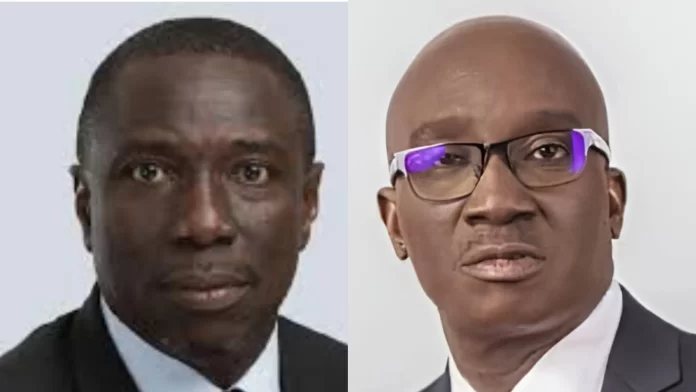By Anthony Ochela, Abuja
Court of Appeal sitting in Abuja on Thursday dismissed the appeal filled by the Peoples Democratic Party, PDP, and its candidate, Asue Ighodalo, against the decision of the Edo State Governorship Election Petition Tribunal which had affirmed the election of Sen. Monday Okpebholo of the All Progressive Congress, APC, as Governor of Edo State.
A three man panel of justices led by Justice M. A. Danjuma, had reserved judgments in the appeal and a cross-appeal filed challenging the decision of the Tribunal over the outcome of the September 21, 2024 Edo governorship election in which the Independent National Electoral Commission (INEC) declared Governor Okpebholo winner.
Delivering the lead judgement in the suit marked: CA/ABJ/EPT/ED/GOV/01/2025, and another (a cross appeal) by the APC and Okpebholo marked CA/ABJ/EPT/ED/GOV/04/2025, Justice Danjuma said the appeal failed for lack of merit as Ighodalo, the 1st appellant, and the PDP, the 2nd appellant, did not provide evidence in oral testimonies to fault the Tribunal’s judgement.
The court agreed with the Tribunal that the 1st and 2nd appellants failed to prove its case that the election was characterized with over voting and/or improper computation of results.
The court also agreed with the Tribunal that the appellant’s witnesses failed to provide testimony to back their claims that INEC inflated figures for the APC’s candidate in some polling units.
The Court also agreed with the Tribunal that some of the testimony provided by some of the witnesses were hearsay for not being presented by the original witnesses who were present at the polling units but by reporting officers.
On the issue of BIVAS, the Court faulted the manner of admittance of the machines by the Tribunal saying the appellants dumped materials on it and did not provide oral testimony or a demonstration of how it works and why it can back their claims on the figures they are faulting.
The court, thereby, expunged all the issues about the BIVAS from the processes and all evidences from it for being short of requirements to add any meaning to the case for the petitioners.
In a statement after the decision of the court, Gov. Okpebholo, through his Chief Press Secretary, Fred Ituah, described the judgment as a confirmation of the people’s will and should serve as a clear signal for all political actors, especially Ighodalo.
He also said; “This ruling is not just a victory for our party, the ruling All Progressives Congress, but a triumph for democracy and the rule of law in our Edo State.”
Speaking with reporters, the Edo State Chairman of the PDP, Tony Aziegbemi, said the party and its candidate would upon receipt and careful study of the Certified True Copy, CTC, of the judgement approach the Supreme Court to push their case.
Recall that after the September 21, 2024 election, INEC had declared Okpebholo the winner of the election, having polled 291,667 votes, while his closest challenger, Asue Ighodalo of the PDP, got 247,274 votes.
Olumide Akpata, the candidate of the Labour Party (LP), finished a distant third with 22,763 votes.
But Ighodalo and the PDP approached the state Election Petition Tribunal to challenge the outcome.
They told the court that the governorship election was invalid because of alleged non-compliance with the provisions of the Electoral Act 2022. They also prayed the court to nullify the declaration of Okpebholo as the winner on the ground that the election was allegedly marred by irregularities.
However, in its judgment delivered on April 2, the tribunal held that their petitions were without merit, adding that the petitioners failed to establish why the outcome of the election should be set aside.
Consequent upon the judgment, Ighodalo and PDP approached the Court of Appeal to challenge the decision, while Okpebholo filed a cross-appeal.
The lawyers for the appellants, while arguing the appeals, prayed the court to reverse the judgment of the election tribunal.
Specifically, counsel to Ighodalo and the PDP, Robert Emukpoeruo (SAN), urged the court to allow the appeal and set aside the judgment of the tribunal.
He argued that in relation to the appellants’ allegations of non-compliance, the tribunal failed to appreciate the nature of the non- compliance complained of.
The appellants’ lawyer argued that the tribunal was also wrong to claim that the documents his clients tendered at trial were dumped on the tribunal.
He also noted that as against the tribunal’s finding, oral evidence was not needed in the nature of the case of the appellants, who were petitioners before the tribunal, stating that his clients did not challenge the conduct of the election, but the conflict in the results collated and announced.
In conclusion, he pointed out that part of his clients’ contention was that the results that were collated at the ward level were not the results declared at the polling units.
However, the lawyers for the respondents urged the court to affirm the judgment by the tribunal and dismiss the appeals.
Their counsel, Onyechi Ikpeazu (SAN) argued that the petition, which they filed before the tribunal and the appeal are totally an academic exercise.
Emmanuel Ukala (SAN), for the APC, and Kanu Agabi, (SAN), for the INEC also argued in similar manner in praying the court to dismiss the appeal and affirm the judgment of the election tribunal.





